全国通用 小升初英语语法-代词精讲 课件(共50张PPT)
文档属性
| 名称 | 全国通用 小升初英语语法-代词精讲 课件(共50张PPT) |
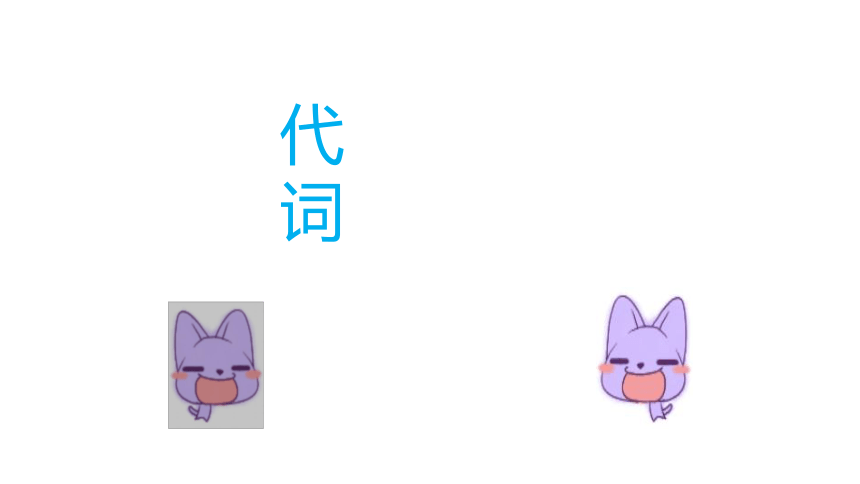
|
|
| 格式 | pptx | ||
| 文件大小 | 1.0MB | ||
| 资源类型 | 教案 | ||
| 版本资源 | 通用版 | ||
| 科目 | 英语 | ||
| 更新时间 | 2021-02-20 00:00:00 | ||
图片预览


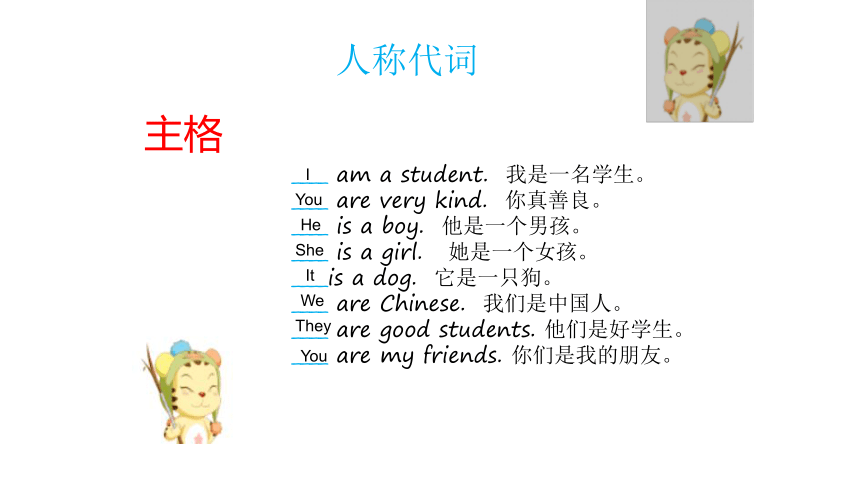
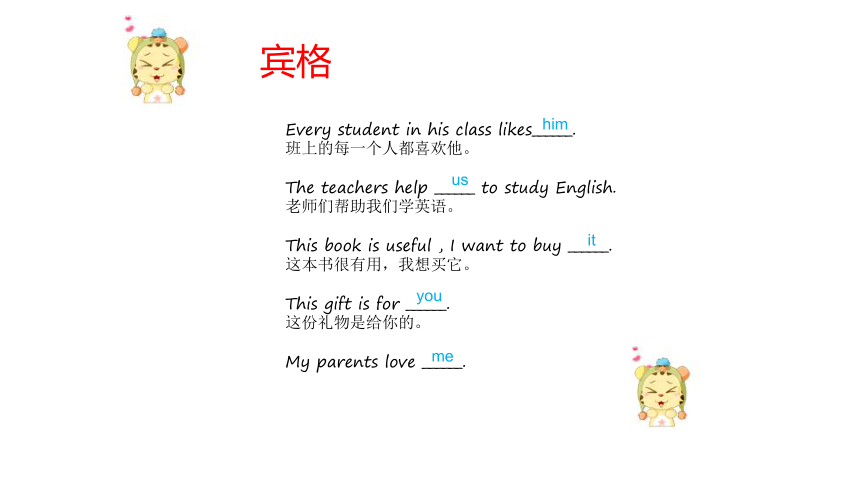
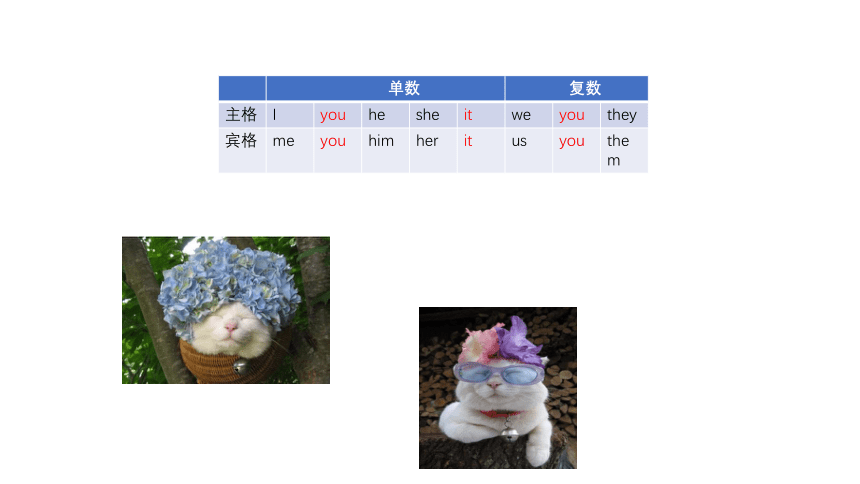
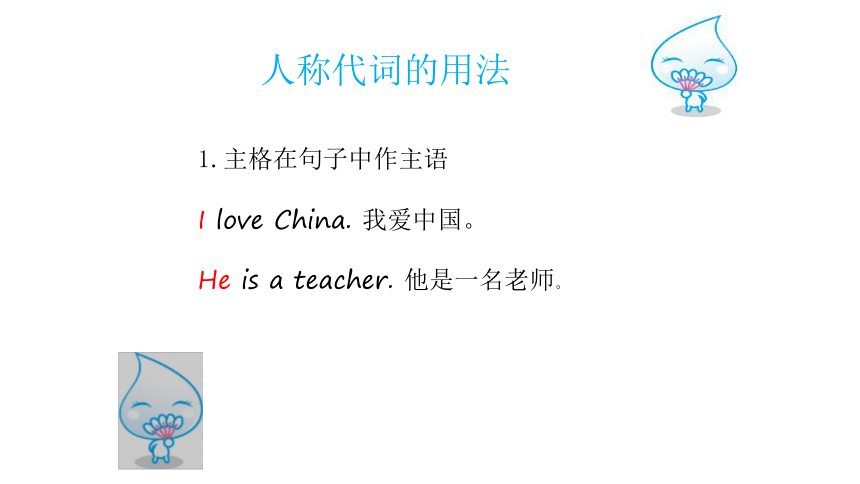
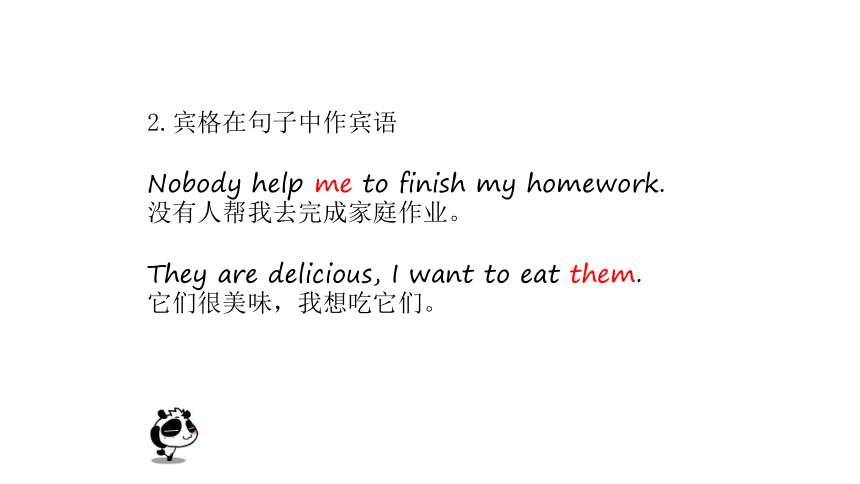
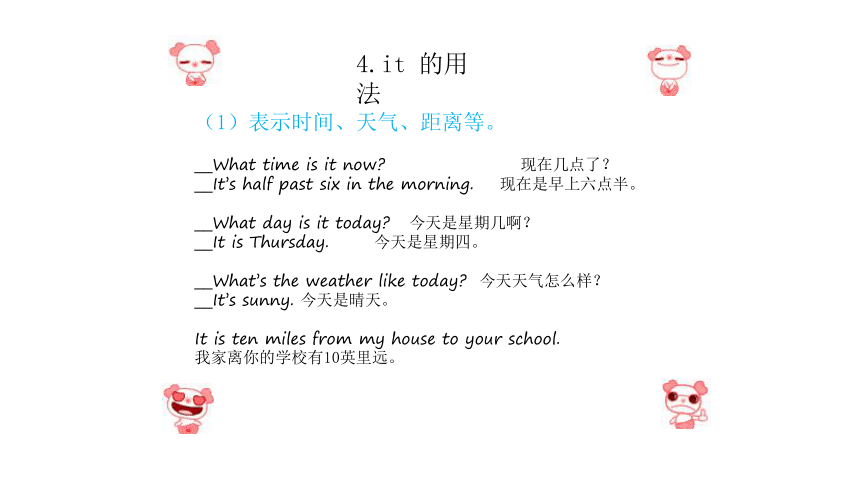
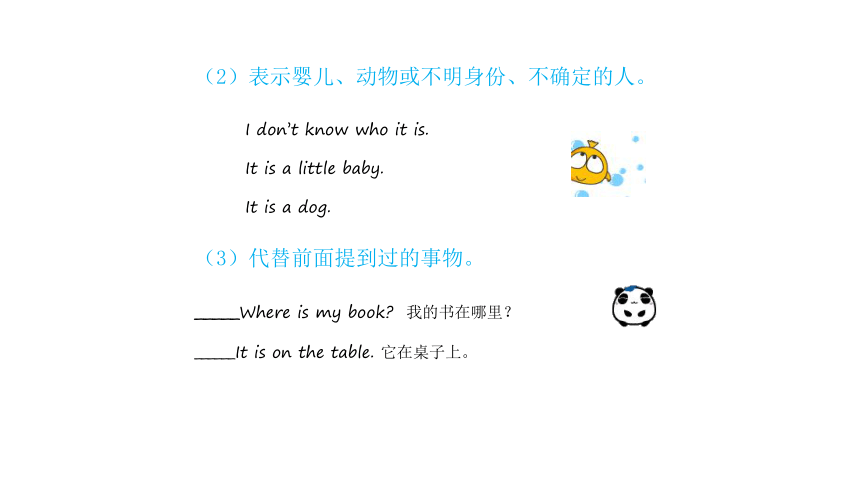
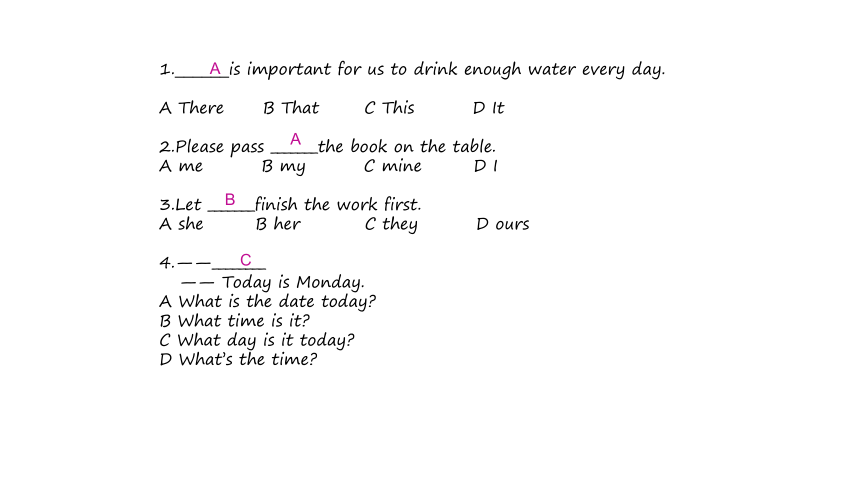
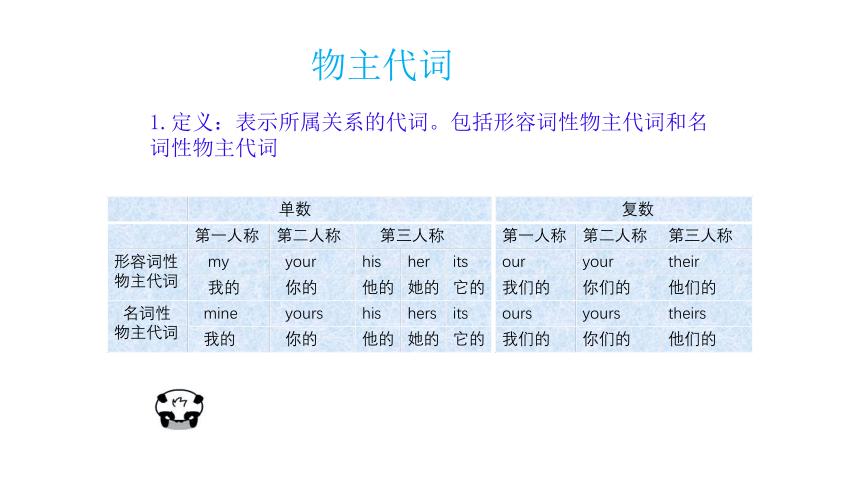
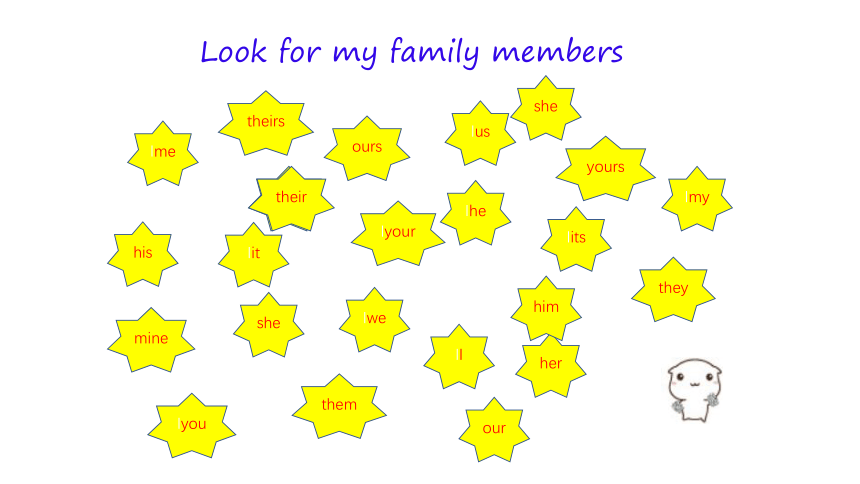
文档简介
代 词
代词:代替人或事物的词。
不定代词
疑问代词
指示代词
反身代词
物主代词
人称代词
人称代词
____ am a student. 我是一名学生。
____ are very kind. 你真善良。
____ is a boy. 他是一个男孩。
____ is a girl. 她是一个女孩。
____is a dog. 它是一只狗。
____ are Chinese. 我们是中国人。
____ are good students. 他们是好学生。
____ are my friends. 你们是我的朋友。
主格
I
You
He
She
It
We
They
You
Every student in his class likes______.
班上的每一个人都喜欢他。
The teachers help ______ to study English.
老师们帮助我们学英语。
This book is useful , I want to buy ______.
这本书很有用,我想买它。
This gift is for ______.
这份礼物是给你的。
My parents love ______.
宾格
you
it
us
him
me
{5C22544A-7EE6-4342-B048-85BDC9FD1C3A}
单数
复数
主格
I
you
he
she
it
we
you
they
宾格
me
you
him
her
it
us
you
them
人称代词的用法
1.主格在句子中作主语
I love China. 我爱中国。
He is a teacher. 他是一名老师。
2.宾格在句子中作宾语
Nobody help me to finish my homework.
没有人帮我去完成家庭作业。
They are delicious, I want to eat them.
它们很美味,我想吃它们。
4.it 的用法
(1)表示时间、天气、距离等。
__What time is it now? 现在几点了?
__It’s half past six in the morning. 现在是早上六点半。
__What day is it today? 今天是星期几啊?
__It is Thursday. 今天是星期四。
__What’s the weather like today? 今天天气怎么样?
__It’s sunny. 今天是晴天。
It is ten miles from my house to your school.
我家离你的学校有10英里远。
(2)表示婴儿、动物或不明身份、不确定的人。
I don’t know who it is.
It is a little baby.
It is a dog.
(3)代替前面提到过的事物。
_____Where is my book? 我的书在哪里?
______It is on the table. 它在桌子上。
1.______is important for us to drink enough water every day.
A There B That C This D It
2.Please pass _______the book on the table.
A me B my C mine D I
3.Let _______finish the work first.
A she B her C they D ours
4.——________
—— Today is Monday.
A What is the date today?
B What time is it?
C What day is it today?
D What’s the time?
A
A
B
C
物主代词
1.定义:表示所属关系的代词。包括形容词性物主代词和名词性物主代词
{5C22544A-7EE6-4342-B048-85BDC9FD1C3A}
单数
第一人称
第二人称
第三人称
形容词性
物主代词
my
your
his
her
its
我的
你的
他的
她的
它的
名词性
物主代词
mine
yours
his
hers
its
我的
你的
他的
她的
它的
{5C22544A-7EE6-4342-B048-85BDC9FD1C3A} 复数
第一人称
第二人称
第三人称
our
your
their
我们的
你们的
他们的
ours
yours
theirs
我们的
你们的
他们的
Look for my family members
hers
her
she
Iyour
Iyou
mine
Imy
Ime
Iits
his
him
Ihe
Iit
our
Ius
Iwe
ours
their
theirs
them
they
II
she
yours
{5C22544A-7EE6-4342-B048-85BDC9FD1C3A}主格
I
you
he
she
it
we
they
宾格
me
you
him
her
it
us
them
形容词性物主代词
my
your
his
her
its
our
their
名词性
物主代词
mine
yours
his
hers
its
ours
theirs
物主代词的用法
1.形容词性物主代词
Open your eyes. 张开你的眼睛。
He is my teacher. 他是我的老师。
It is her cat. 它是她的猫。
Nobody saw their children. 没有人见过他们的孩子。
相当于形容词,用在名词前面。
2.名词性物主代词
I don’t want your book , I want his.
我不想要你的书,我想要他的书。
There are two schoolbags , the red one is mine , the black one is hers.
这里有两个书包,红色那个是我的书包,黑色那个是她的书包。
He is a friend of mine.
他是我的一个朋友。
相当于名词,后面不再加名词。
my schoolbag
1.It is ______book, not ______.
这是我的书,不是你的。
2.My sister has a watch , but ______ is better than ______.
我姐姐也有一个手表,但我的比她的好。
3.Computers are very useful , we use ______ for ______ study.
电脑非常有用,我们用它们来帮助我们学习。
4.Could you give me some apples of ______?
你能把他们的苹果给我一些吗?
my
yours
mine
hers
them
our
theirs
反身代词
1.定义:表示反射或强调的代词。
{5C22544A-7EE6-4342-B048-85BDC9FD1C3A}
单数
复数
第一人称
myself 我自己
ourselves 我们自己
第二人称
yourself 你自己
yourselves 你们自己
第三人称
himself/herself/itself 他/她/它自己
themselves 他们自己
第一人称、第二人称的反身代词:形容词性物主代词+self / selves
第三人称的反身代词:人称代词宾格+ self / selves
反身代词的用法
1.用作动词和介词的宾语
She found herself in his house.
她发现自己在他的房子里。
Please help yourselves to some soup.
喝一点汤吧。
As for myself , I like Beijing best.
就我来说,我最喜欢北京。
2.用来加强语气
I myself can finish it.
我自己可以完成它。
The boy will call you himself.
男孩会亲自打电话给你的。
3.反身代词的一些短语
I can finish the homework by myself. 独自地、单独地
Please help yourself to some fish. 请随便
He built a new house for himself. 为自己
They enjoyed themselves in the park. 过得愉快
1.Don’t worry, ______ can finish the job.
A Myself B Me C I myself D Myself I
2.Help ______ to some meat , guys.
A ourselves B you C yourself D yourselves
3.Everyone ______ during this holiday.
A by oneself B enjoyed himself C help oneself D for himself
4.The teacher will call you ______.
A him B his C yourself D himself
D
D
B
D
指示代词
1.定义:用来指代或标记人或事物的代词。
{5C22544A-7EE6-4342-B048-85BDC9FD1C3A}this 这个
that 那个
these 这些
those 那些
1.在句子中做主语、宾语和定语等。
I like that. 我喜欢那个。
This schoolbag is mine. 这个书包是我的。
These are my books. 这些是我的书。
2.this 和 these用于代替即将要讲或要做的事情;that和those 用于代替前面讲过或做过的事。
What I want to say is this: Beijing is very big.
我想说的是北京真的很大。
The weather in Guangzhou is better than that in Beijing.
广州的天气比北京好。
3. this 和 these 用于指代空间上较近的人或事物;that和those 用于指代空间上较远的人或事物。
This is a bear, that is a chicken.
这是一只小熊,那是一只小鸡。
4.用于介绍别人。
Hello, everyone . This is May. She is my friend.
大家好,这是May , 她是我的朋友。
5.用于电话术语,this指自己,that指对方。
May: Hello !This is May speaking. Who is that?
你好,我是May ,你是谁?
Jack: Jack speaking. Is that you, May ? Great !
我是Jack,是May吗?太好了!
1.This is a woman teacher. (改为复数形式)
____________________________________
2. There are many students in the classroom . (改为疑问句并作否定回答)
_________________________________________________________________
3.Hurry up! There is _____ time left.
A a little B few C little D much
4.______ of the boy plays football very well.
A Neither B Both C All D some
5.______humans ______ animals can live without air.
A Both , and B Neither , nor C Either , or D not only , but also
These are women teachers.
Are there any students in the classroom? No, there aren’t.
C
A
B
不定代词
1.定义:表示不确定的、非特指的代词。
some any few a few little a little many much one neither every each no both等
{5C22544A-7EE6-4342-B048-85BDC9FD1C3A}
body
one
thing
every
everybody
everyone
everything
some
somebody
someone
something
any
anybody
anyone
anything
no
nobody
no one
nothing
1.some 和 any
There are some apples on the table.
桌子上有一些苹果。
There aren’t any apples on the table.
桌子上没有苹果。
Are there any apples on the table?
桌子上有一些苹果吗?
句中,any用通常some用在肯定在否定句和疑问句中。
_____Would you like some coffee?
要不要喝点咖啡?
_______Yes , please.
好啊!
_______Could you please sell me some flowers?
能卖一些花给我吗?
_______ Of course.
当然。
当表示建议或请求,希望得到肯定回答时,some可用于疑问句当中。
any表示“任何、任一”时,可用于肯定句。
Any child can sing this song.
任何小孩都会唱这首歌。
You can come here at any time.
你任何时候都可以来这里。
2.both 和all
both 主要用于两者之间
Both of them are Chinese. 他们两个都是中国人。
She has two dogs . They are both black. 她有两只狗,他们都是黑色的。
Both May and Mary are good students. May 和 Mary 都是好学生。
all 主要用于三者或三者以上
All students had a picnic yesterday.
昨天所有学生都去野炊了。
She decided to invite all of her friends to her house.
她决定邀请所有的朋友到家里来。
either 和neither
either :两者中的任一个
There are two books , you can choose either one .
Either of you should come with me.
You can choose either this one or that one.
I don’t know , either.
neither:两者都不
1.Mary : Which one do you like better , the red one or the black one?
Jack: I like neither( of them).
2.Neither you nor he likes English.
你和他都不喜欢英语。
none :三者或三者以上都不
Mary:There are five hats, which one do you best?
Jack : I like none of them.
{5C22544A-7EE6-4342-B048-85BDC9FD1C3A}both
两者都
both of / both…and
all
三者或三者以上都
all of
either
两者中的任一个
either of / either…or
any
三者或三者中的任一个
any of
neither
两者都不
neither of /neither…nor
none
三者或三者以上都不
none of
every和each
each强调“个别”,every强调“整体”
Each one of them enjoys the film.
他们每一个人都很喜欢这部电影。
Every one of them enjoys the film.
他们大家都很喜欢这部电影。
{5C22544A-7EE6-4342-B048-85BDC9FD1C3A}few
几乎没有
加可数名词
否定
a few
一些,少许
肯定
little
几乎没有
加不可
数名词
否定
a little
一些,少许
肯定
few 、a few 和 little、a little
There are ______ flowers in winter.
冬天几乎没有花。
There are still ______ students in the classroom.
课室里还有一些学生。
Hurry up . There is ______ time left.
快点,我们没时间了。
There is still ______ water in the glass.
杯子里还有一些水。
few
a few
little
a little
another 、other、the other、others和 the others
1.other 通常用作形容词,泛指“其他的(人或事物)”
Do you have any other problems?
你还有其他问题吗?
Ask other people. 问问别人吧。
2.the other
n. 用于两者之间,表示“ 另一个”:
He has two schoolbags , one is red , the other is black.
adj. 后面可加单数名词,也可加复数名词。
On the the other side of the river , there is a tall building.
Mary is much taller than the other girls.
3.others n. 用作主语和宾语。泛指“另外几个,其余的人或事物”
Some of us are watching TV, others are talking happily.
我们中一些人在看电视,另外有一些在开心的聊天。
Please give some others to me.
请给我别的东西吧。
4.the others n. 特指某一范围内的其他的人或事物。
Two boys will go to the zoo , the others will stay at home.
两个男孩将去动物园,其他人留在家里。
5.another
n. 用于三者或三者以上,表示“另一个”。
I don’t like this one , please show me another.
我不喜欢这个,请给我看另一个。
adj. 后加单数名词。
I don’t like this one , please show me another one.
another 、other、the other、others和 the others
{5C22544A-7EE6-4342-B048-85BDC9FD1C3A}
单数
复数
名词性
形容词性
名词性
形容词性
特指
the other
the other
the others
the other
除去一个或几个后剩下的那一个(人或物)
除去一个或几个后所剩下的全部(人或物)
泛指
another
another
others
other
除去一个或几个后任意的另一个(人或物)
除去一个或几个后任意的另一些(人或物)
疑问代词
1.定义:用来引导特殊疑问句的代词。
who
what
whom
whose
which
1.who (谁):用来对人提问,通常作主语。
Who are you? 你是谁啊?
Who is the boy over there? 那边的男孩的是谁?
2.whom(谁):是who的宾格形式,作宾语。
Whom is Mary talking about?
玛丽在谈论谁啊?
Whom are you looking for?
你在找谁啊?
3.what(什么):用来对事或物进行提问。
What are you doing? 你在干什么?
What is this? 这是什么?
4.whose(谁的):用来对所属关系进行提问。
Whose book is this ? 这是谁的书?
Whose cat is it ? 这是谁的猫?
5.which(哪一个):用来对人、事、物进行提问。
Which bag is more beautiful? 哪一个包跟好看?
Which one is heavier?
哪一个更重?
1.——______is your name?
——I’m May.
2.——______one do you like best?
——The red one.
3.——______is that boy?
——My brother.
4.——______skirt is this?
——Sorry, I don’t know.
5.——______are you talking to?
——My teacher.
each other 主要用于两者之间
one another 主要用于三者或三者之间
May and Lily often help each other.
梅和莉莉经常互相帮助。
We should help one another when in trouble.
有困难时我们应该互相帮助。
相互代词
HOMEWORK
{5C22544A-7EE6-4342-B048-85BDC9FD1C3A}中文
主格
宾格
形容词性物主代词
名词性
物主代词
反身
代词
我
你
他
她
它
我们
你们
他们
1.完成以下表格。
2.选择题
1.Would you please give me _____ hot tea?
A any B some C little D a
2. This blue skirt is better than the green ______.
A / B one C skirts D ones
3.Do you have ______ to tell me?
A something important B important something
C any thing important D important something
4.I met a friend of _____ on ______way home.
A mine my B mine / C my mine D me my
3.用适当的代词填空。
A :little all neither both another
1.Mary: Please help yourself to some meat.
Jack: Sorry, I can’t now, because ______ my hands are dirty.
2.Mary: Which one do you like better, the blue one or the red one?
Jack: I like _____ of them.
3.There is ______ rain in Guangzhou these days.
4.This one is broken , please give me ______ one.
B: anything each many every other fewer something
1.How ______ new words are there in this lesson?
2.There’s a red ball in the boy’s hand and an apple in his ______ hand.
3.______ child enjoys Christmas . They ______ each have some presents.
4.She did better than I . There are ______ mistakes in her test than in mine.
5.Mum, I am hungry .I want to eat ______ . ______will do.
Thank you!
代词:代替人或事物的词。
不定代词
疑问代词
指示代词
反身代词
物主代词
人称代词
人称代词
____ am a student. 我是一名学生。
____ are very kind. 你真善良。
____ is a boy. 他是一个男孩。
____ is a girl. 她是一个女孩。
____is a dog. 它是一只狗。
____ are Chinese. 我们是中国人。
____ are good students. 他们是好学生。
____ are my friends. 你们是我的朋友。
主格
I
You
He
She
It
We
They
You
Every student in his class likes______.
班上的每一个人都喜欢他。
The teachers help ______ to study English.
老师们帮助我们学英语。
This book is useful , I want to buy ______.
这本书很有用,我想买它。
This gift is for ______.
这份礼物是给你的。
My parents love ______.
宾格
you
it
us
him
me
{5C22544A-7EE6-4342-B048-85BDC9FD1C3A}
单数
复数
主格
I
you
he
she
it
we
you
they
宾格
me
you
him
her
it
us
you
them
人称代词的用法
1.主格在句子中作主语
I love China. 我爱中国。
He is a teacher. 他是一名老师。
2.宾格在句子中作宾语
Nobody help me to finish my homework.
没有人帮我去完成家庭作业。
They are delicious, I want to eat them.
它们很美味,我想吃它们。
4.it 的用法
(1)表示时间、天气、距离等。
__What time is it now? 现在几点了?
__It’s half past six in the morning. 现在是早上六点半。
__What day is it today? 今天是星期几啊?
__It is Thursday. 今天是星期四。
__What’s the weather like today? 今天天气怎么样?
__It’s sunny. 今天是晴天。
It is ten miles from my house to your school.
我家离你的学校有10英里远。
(2)表示婴儿、动物或不明身份、不确定的人。
I don’t know who it is.
It is a little baby.
It is a dog.
(3)代替前面提到过的事物。
_____Where is my book? 我的书在哪里?
______It is on the table. 它在桌子上。
1.______is important for us to drink enough water every day.
A There B That C This D It
2.Please pass _______the book on the table.
A me B my C mine D I
3.Let _______finish the work first.
A she B her C they D ours
4.——________
—— Today is Monday.
A What is the date today?
B What time is it?
C What day is it today?
D What’s the time?
A
A
B
C
物主代词
1.定义:表示所属关系的代词。包括形容词性物主代词和名词性物主代词
{5C22544A-7EE6-4342-B048-85BDC9FD1C3A}
单数
第一人称
第二人称
第三人称
形容词性
物主代词
my
your
his
her
its
我的
你的
他的
她的
它的
名词性
物主代词
mine
yours
his
hers
its
我的
你的
他的
她的
它的
{5C22544A-7EE6-4342-B048-85BDC9FD1C3A} 复数
第一人称
第二人称
第三人称
our
your
their
我们的
你们的
他们的
ours
yours
theirs
我们的
你们的
他们的
Look for my family members
hers
her
she
Iyour
Iyou
mine
Imy
Ime
Iits
his
him
Ihe
Iit
our
Ius
Iwe
ours
their
theirs
them
they
II
she
yours
{5C22544A-7EE6-4342-B048-85BDC9FD1C3A}主格
I
you
he
she
it
we
they
宾格
me
you
him
her
it
us
them
形容词性物主代词
my
your
his
her
its
our
their
名词性
物主代词
mine
yours
his
hers
its
ours
theirs
物主代词的用法
1.形容词性物主代词
Open your eyes. 张开你的眼睛。
He is my teacher. 他是我的老师。
It is her cat. 它是她的猫。
Nobody saw their children. 没有人见过他们的孩子。
相当于形容词,用在名词前面。
2.名词性物主代词
I don’t want your book , I want his.
我不想要你的书,我想要他的书。
There are two schoolbags , the red one is mine , the black one is hers.
这里有两个书包,红色那个是我的书包,黑色那个是她的书包。
He is a friend of mine.
他是我的一个朋友。
相当于名词,后面不再加名词。
my schoolbag
1.It is ______book, not ______.
这是我的书,不是你的。
2.My sister has a watch , but ______ is better than ______.
我姐姐也有一个手表,但我的比她的好。
3.Computers are very useful , we use ______ for ______ study.
电脑非常有用,我们用它们来帮助我们学习。
4.Could you give me some apples of ______?
你能把他们的苹果给我一些吗?
my
yours
mine
hers
them
our
theirs
反身代词
1.定义:表示反射或强调的代词。
{5C22544A-7EE6-4342-B048-85BDC9FD1C3A}
单数
复数
第一人称
myself 我自己
ourselves 我们自己
第二人称
yourself 你自己
yourselves 你们自己
第三人称
himself/herself/itself 他/她/它自己
themselves 他们自己
第一人称、第二人称的反身代词:形容词性物主代词+self / selves
第三人称的反身代词:人称代词宾格+ self / selves
反身代词的用法
1.用作动词和介词的宾语
She found herself in his house.
她发现自己在他的房子里。
Please help yourselves to some soup.
喝一点汤吧。
As for myself , I like Beijing best.
就我来说,我最喜欢北京。
2.用来加强语气
I myself can finish it.
我自己可以完成它。
The boy will call you himself.
男孩会亲自打电话给你的。
3.反身代词的一些短语
I can finish the homework by myself. 独自地、单独地
Please help yourself to some fish. 请随便
He built a new house for himself. 为自己
They enjoyed themselves in the park. 过得愉快
1.Don’t worry, ______ can finish the job.
A Myself B Me C I myself D Myself I
2.Help ______ to some meat , guys.
A ourselves B you C yourself D yourselves
3.Everyone ______ during this holiday.
A by oneself B enjoyed himself C help oneself D for himself
4.The teacher will call you ______.
A him B his C yourself D himself
D
D
B
D
指示代词
1.定义:用来指代或标记人或事物的代词。
{5C22544A-7EE6-4342-B048-85BDC9FD1C3A}this 这个
that 那个
these 这些
those 那些
1.在句子中做主语、宾语和定语等。
I like that. 我喜欢那个。
This schoolbag is mine. 这个书包是我的。
These are my books. 这些是我的书。
2.this 和 these用于代替即将要讲或要做的事情;that和those 用于代替前面讲过或做过的事。
What I want to say is this: Beijing is very big.
我想说的是北京真的很大。
The weather in Guangzhou is better than that in Beijing.
广州的天气比北京好。
3. this 和 these 用于指代空间上较近的人或事物;that和those 用于指代空间上较远的人或事物。
This is a bear, that is a chicken.
这是一只小熊,那是一只小鸡。
4.用于介绍别人。
Hello, everyone . This is May. She is my friend.
大家好,这是May , 她是我的朋友。
5.用于电话术语,this指自己,that指对方。
May: Hello !This is May speaking. Who is that?
你好,我是May ,你是谁?
Jack: Jack speaking. Is that you, May ? Great !
我是Jack,是May吗?太好了!
1.This is a woman teacher. (改为复数形式)
____________________________________
2. There are many students in the classroom . (改为疑问句并作否定回答)
_________________________________________________________________
3.Hurry up! There is _____ time left.
A a little B few C little D much
4.______ of the boy plays football very well.
A Neither B Both C All D some
5.______humans ______ animals can live without air.
A Both , and B Neither , nor C Either , or D not only , but also
These are women teachers.
Are there any students in the classroom? No, there aren’t.
C
A
B
不定代词
1.定义:表示不确定的、非特指的代词。
some any few a few little a little many much one neither every each no both等
{5C22544A-7EE6-4342-B048-85BDC9FD1C3A}
body
one
thing
every
everybody
everyone
everything
some
somebody
someone
something
any
anybody
anyone
anything
no
nobody
no one
nothing
1.some 和 any
There are some apples on the table.
桌子上有一些苹果。
There aren’t any apples on the table.
桌子上没有苹果。
Are there any apples on the table?
桌子上有一些苹果吗?
句中,any用通常some用在肯定在否定句和疑问句中。
_____Would you like some coffee?
要不要喝点咖啡?
_______Yes , please.
好啊!
_______Could you please sell me some flowers?
能卖一些花给我吗?
_______ Of course.
当然。
当表示建议或请求,希望得到肯定回答时,some可用于疑问句当中。
any表示“任何、任一”时,可用于肯定句。
Any child can sing this song.
任何小孩都会唱这首歌。
You can come here at any time.
你任何时候都可以来这里。
2.both 和all
both 主要用于两者之间
Both of them are Chinese. 他们两个都是中国人。
She has two dogs . They are both black. 她有两只狗,他们都是黑色的。
Both May and Mary are good students. May 和 Mary 都是好学生。
all 主要用于三者或三者以上
All students had a picnic yesterday.
昨天所有学生都去野炊了。
She decided to invite all of her friends to her house.
她决定邀请所有的朋友到家里来。
either 和neither
either :两者中的任一个
There are two books , you can choose either one .
Either of you should come with me.
You can choose either this one or that one.
I don’t know , either.
neither:两者都不
1.Mary : Which one do you like better , the red one or the black one?
Jack: I like neither( of them).
2.Neither you nor he likes English.
你和他都不喜欢英语。
none :三者或三者以上都不
Mary:There are five hats, which one do you best?
Jack : I like none of them.
{5C22544A-7EE6-4342-B048-85BDC9FD1C3A}both
两者都
both of / both…and
all
三者或三者以上都
all of
either
两者中的任一个
either of / either…or
any
三者或三者中的任一个
any of
neither
两者都不
neither of /neither…nor
none
三者或三者以上都不
none of
every和each
each强调“个别”,every强调“整体”
Each one of them enjoys the film.
他们每一个人都很喜欢这部电影。
Every one of them enjoys the film.
他们大家都很喜欢这部电影。
{5C22544A-7EE6-4342-B048-85BDC9FD1C3A}few
几乎没有
加可数名词
否定
a few
一些,少许
肯定
little
几乎没有
加不可
数名词
否定
a little
一些,少许
肯定
few 、a few 和 little、a little
There are ______ flowers in winter.
冬天几乎没有花。
There are still ______ students in the classroom.
课室里还有一些学生。
Hurry up . There is ______ time left.
快点,我们没时间了。
There is still ______ water in the glass.
杯子里还有一些水。
few
a few
little
a little
another 、other、the other、others和 the others
1.other 通常用作形容词,泛指“其他的(人或事物)”
Do you have any other problems?
你还有其他问题吗?
Ask other people. 问问别人吧。
2.the other
n. 用于两者之间,表示“ 另一个”:
He has two schoolbags , one is red , the other is black.
adj. 后面可加单数名词,也可加复数名词。
On the the other side of the river , there is a tall building.
Mary is much taller than the other girls.
3.others n. 用作主语和宾语。泛指“另外几个,其余的人或事物”
Some of us are watching TV, others are talking happily.
我们中一些人在看电视,另外有一些在开心的聊天。
Please give some others to me.
请给我别的东西吧。
4.the others n. 特指某一范围内的其他的人或事物。
Two boys will go to the zoo , the others will stay at home.
两个男孩将去动物园,其他人留在家里。
5.another
n. 用于三者或三者以上,表示“另一个”。
I don’t like this one , please show me another.
我不喜欢这个,请给我看另一个。
adj. 后加单数名词。
I don’t like this one , please show me another one.
another 、other、the other、others和 the others
{5C22544A-7EE6-4342-B048-85BDC9FD1C3A}
单数
复数
名词性
形容词性
名词性
形容词性
特指
the other
the other
the others
the other
除去一个或几个后剩下的那一个(人或物)
除去一个或几个后所剩下的全部(人或物)
泛指
another
another
others
other
除去一个或几个后任意的另一个(人或物)
除去一个或几个后任意的另一些(人或物)
疑问代词
1.定义:用来引导特殊疑问句的代词。
who
what
whom
whose
which
1.who (谁):用来对人提问,通常作主语。
Who are you? 你是谁啊?
Who is the boy over there? 那边的男孩的是谁?
2.whom(谁):是who的宾格形式,作宾语。
Whom is Mary talking about?
玛丽在谈论谁啊?
Whom are you looking for?
你在找谁啊?
3.what(什么):用来对事或物进行提问。
What are you doing? 你在干什么?
What is this? 这是什么?
4.whose(谁的):用来对所属关系进行提问。
Whose book is this ? 这是谁的书?
Whose cat is it ? 这是谁的猫?
5.which(哪一个):用来对人、事、物进行提问。
Which bag is more beautiful? 哪一个包跟好看?
Which one is heavier?
哪一个更重?
1.——______is your name?
——I’m May.
2.——______one do you like best?
——The red one.
3.——______is that boy?
——My brother.
4.——______skirt is this?
——Sorry, I don’t know.
5.——______are you talking to?
——My teacher.
each other 主要用于两者之间
one another 主要用于三者或三者之间
May and Lily often help each other.
梅和莉莉经常互相帮助。
We should help one another when in trouble.
有困难时我们应该互相帮助。
相互代词
HOMEWORK
{5C22544A-7EE6-4342-B048-85BDC9FD1C3A}中文
主格
宾格
形容词性物主代词
名词性
物主代词
反身
代词
我
你
他
她
它
我们
你们
他们
1.完成以下表格。
2.选择题
1.Would you please give me _____ hot tea?
A any B some C little D a
2. This blue skirt is better than the green ______.
A / B one C skirts D ones
3.Do you have ______ to tell me?
A something important B important something
C any thing important D important something
4.I met a friend of _____ on ______way home.
A mine my B mine / C my mine D me my
3.用适当的代词填空。
A :little all neither both another
1.Mary: Please help yourself to some meat.
Jack: Sorry, I can’t now, because ______ my hands are dirty.
2.Mary: Which one do you like better, the blue one or the red one?
Jack: I like _____ of them.
3.There is ______ rain in Guangzhou these days.
4.This one is broken , please give me ______ one.
B: anything each many every other fewer something
1.How ______ new words are there in this lesson?
2.There’s a red ball in the boy’s hand and an apple in his ______ hand.
3.______ child enjoys Christmas . They ______ each have some presents.
4.She did better than I . There are ______ mistakes in her test than in mine.
5.Mum, I am hungry .I want to eat ______ . ______will do.
Thank you!
